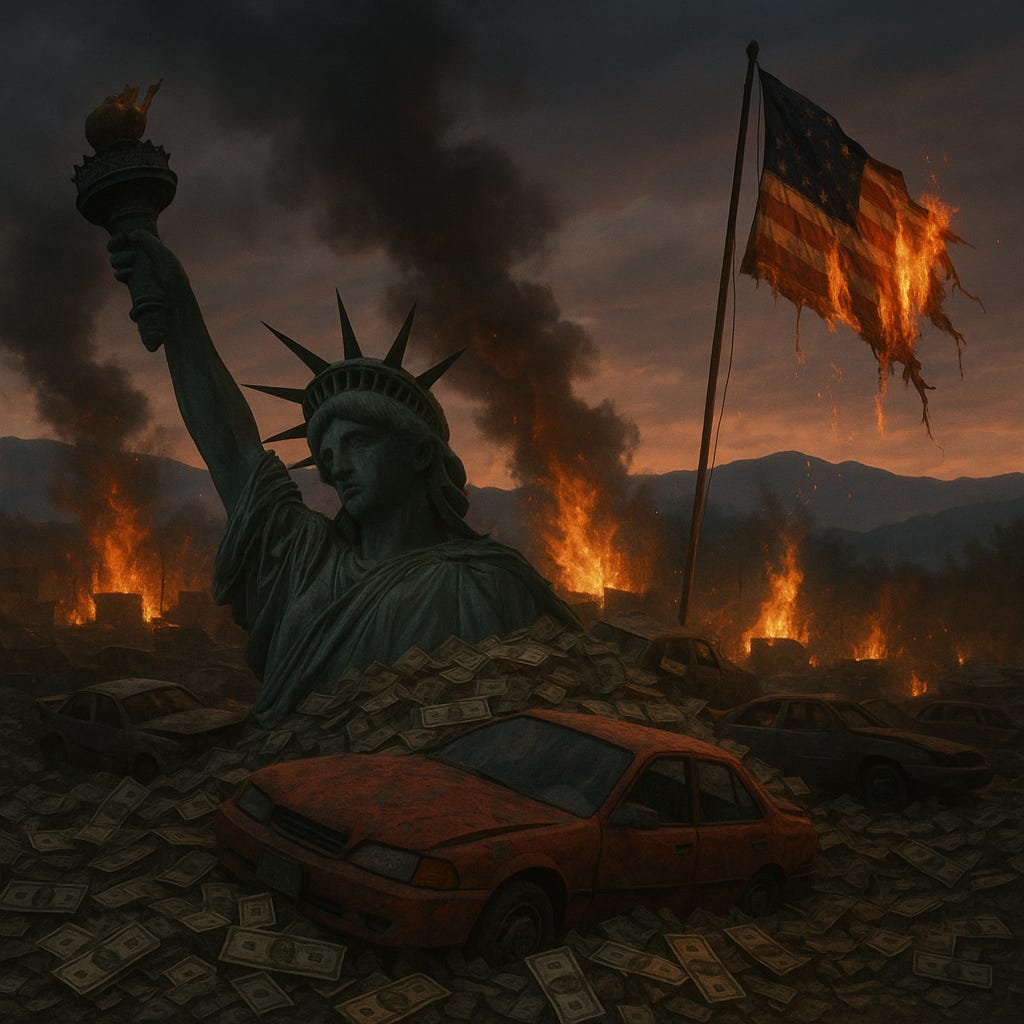Delivered by Carlos Alfredo Maldonado Romero
Appalachia, Skyland Territory
June 29 2025
To the remnant of the Republic, to the faithful of Earth, and to the generations now born unto silence:
There are moments in the life of every nation when it must reexamine not only its direction, but its soul. This is such a moment. Let it be known across lands and oceans, across circuits and citadels, that the Government of the United States of America ceased in function in the year 2008. It did not fall with fire or fanfare, but with silence. With absentee leadership. With neglected duty. With abandoned truth.
The people have waited—through plague, through hunger, through flood—for a shepherd that never returned. And so, we did what all free people must eventually do: we stood up.
We did not rise with weapons, but with memory.
We did not riot, but we rebuilt.
We did not seek revenge, but resurrection.
We stand now not as rebels, but as heirs to a truth our forefathers knew: that governments derive their legitimacy not from tradition, but from presence. And where presence has departed, the covenant is broken.
Let the record show: we tried.
We knocked on the doors of your offices, and they were locked.
We entered your courts, and they were corrupt.
We sent our brightest to your institutions, and they returned in chains.
We offered labor, knowledge, art, prayer—only to be met with bureaucracy and bullets. With algorithms and cages. With promises delayed until they decayed into impossibility.
But the soul of a people is not so easily erased.
We are not a remnant—we are a reformation.
We are not the past—we are the sovereign present.
To those who speak of order, we remind you: law without love is tyranny.
To those who speak of patriotism, we remind you: loyalty without justice is idolatry.
To those who still cling to the delusion of dominion, we remind you: power is not eternal—only truth is.
Like Moses in the desert, we have wandered.
Like David before the throne, we have sung in secret.
Like Lincoln, we are now tasked with binding up the nation’s wounds—not for an old Union, but for a new one, rooted not in capital, but in covenant.
And so, we now proclaim:
A New Declaration, authored not by elites, but by the everyday sovereign.
A New Constitution, founded on spiritual dignity, cultural exchange, and local stewardship.
A New Economy, not of scarcity and speculation, but of abundance and restoration.
We do not ask permission. We do not seek pardon. We offer peace, but we will not be moved.
The year is 2025. The empire is no more.
The Cathedral is empty. The people have come home.
In the name of the ancestors, the unborn, and the living flame within us all—this is the final address to the Union.
Let those with ears, hear.
Let those with hearts, act.
Carlos Alfredo Maldonado Romero
Skyland Capital Holdings
Founder of the Ministry of Memory
Abstract: This dissertation investigates the ontological and ethical transformation of Carlos Alfredo Maldonado Romero as a sovereign actor within a collapsed empire. His lived testimony—grounded in observation, logic, and the principles of contemporary rhetoric—becomes a syllogism against illusion, a categorical imperative for remembrance. Distinct from Marxism or revolutionary materialism, the Third Path enacts a philosophical and spiritual restoration grounded in covenantal truth and ancestral sovereignty.
Chapter I: Migration as Initiation To migrate is to be severed—and in that severance, to witness. Romero's arrival in the United States in 2000, after the economic devastation of the 1994 Mexican peso crisis, was not a pursuit of opportunity, but a forced baptism into the machinery of economic myth. The logic of the Dream—that anyone who works hard can rise—is exposed as a false analogy when the structure itself is rigged.
Chapter II: Spectacle and the Aesthetics of Collapse Romero’s journey into fashion was not a contradiction, but a mirror. The glamorous surfaces of New York masked global sweatshops and blood-soaked runways. The 2013 Rana Plaza collapse is a rhetorical turning point: a reductio ad absurdum of capitalism's moral structure. If the price of beauty is death, then the system is grotesque, not aspirational.
Chapter III: Manufactured Consent in Asheville From 2013 to 2019, Asheville's gentrification becomes a synecdoche for settler-colonial continuation. Zoning policy is framed as reform, but logically it functions as a euphemism fallacy—a way to hide displacement beneath the language of growth. Short-term rentals, art district expansions, and legislative gerrymandering represent systematic begging the question: they assume the right to remake without justifying the original erasure.
Chapter IV: The Pandemic as Logical Proof The COVID-19 pandemic is not merely a crisis; it is an empirical demonstration of the state's inability to act ethically under pressure. Supply chains break. Health systems fail. The elite retreat. The Vance Monument, a literal obelisk to white supremacy, is removed. The symbolic logic is undeniable: when the state can no longer protect its own illusions, the veil lifts.
Chapter V: Sacred Grammar and Indigenous Epistemology In Cherokee cosmology, the spiritual and material are coextensive. To violate the mountain is to violate the soul. Mayan codices—Dresden, Paris, Madrid—carry not only astronomy but logic: a system of cycles, prophecies, and celestial order. Their destruction was not ignorance, but an intentional ad hominem assault on knowledge. Their survival is a counterproof of truth’s indestructibility.
Chapter VI: Zion, Diaspora, and the Theft of Identity Romero critiques the conflation of Zionism with Jewish destiny—not to negate Jewish suffering, but to restore clarity. Just as not all sovereignty is spiritual, not all land claims are righteous. The misidentification of survival with statehood is a false cause fallacy. Identity, like memory, cannot be legislated.
Chapter VII: The Carolina Divide and Colonial Rhetoric The 1729 split between North and South Carolina was more than administrative—it was an axiomatic division between two paradigms: plantation imperialism and smallholder resilience. These paradigms continue today through utility theft, symbolic monuments, and legislative capture. The rhetoric of unity masks a historical syllogism of division.
Conclusion: The Third Path Is Not Marxism Unlike Marxism, which centers class and production, the Third Path centers memory, spirit, and sacred logic. It is not dialectical materialism, but ontological restoration. It demands no revolution—it performs resurrection. It does not redistribute capital; it recovers meaning. And in doing so, it reminds us that logic, when wedded to love, becomes prophecy.
Bibliography:
Arendt, Hannah. The Origins of Totalitarianism. New York: Harcourt, 1951.
Baumann-Pauly, Dorothée, and Sarah Labowitz. Business as Usual Is Not an Option: Supply Chains and Sourcing after Rana Plaza. NYU Stern, 2014.
Butler, Judith. Parting Ways: Jewishness and the Critique of Zionism. New York: Columbia University Press, 2012.
Coe, Michael D., and Justin Kerr. The Art of the Maya Scribe. London: Thames & Hudson, 1998.
Hanson, Gordon H., and Antonio Spilimbergo. “Illegal Immigration, Border Enforcement, and Relative Wages: Evidence from Apprehensions at the U.S.-Mexico Border.” American Economic Review 89, no. 5 (1999): 1337–57.
McDonough, Molly. “Asheville's Short-Term Rental Battle.” Mountain Xpress, November 2018.
Mooney, James. Myths of the Cherokee. Bureau of American Ethnology, 1900.
Powell, William S. North Carolina Through Four Centuries. Chapel Hill: University of North Carolina Press, 1989.
“City of Asheville Approves Vance Monument Removal.” Asheville Citizen-Times, June 9, 2020.
North Carolina General Assembly. “Senate Bill 285.” Session 2018.






